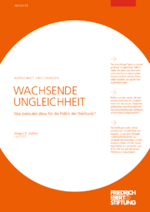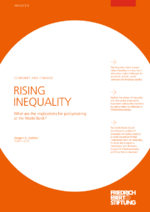Is redistribution necessary to reduce inequality?
Germany’s Executive Director to the World Bank, Jürgen Zattler, has introduced a bold idea. To combat rising inequality, the World Bank should immediately take two steps to improve the coherence of its policies: (1) improve research and data collection to better understand the nuances of inequality, and (2) incorporate its goal on shared prosperity into its business model in much the same way as it has done for the goal on extreme poverty.
In an online roundtable with Patrizio Pagano, the Executive Director for Albania, Greece, Italy, Malta, Portugal, San Marino and Timor-Leste, and Cecilia Nahón, the Alternate Executive Director for Argentina, Bolivia, Chile, Paraguay, Peru and Uruguay, Mr. Zattler made clear the urgency of better research and data on inequality.
To address this concern, José Gabriel Palma, emeritus Professor from Cambridge University and world expert on the measurement of inequality, joined the discussion. Professor Palma spoke right away to the crux of the problem: we do not have good data on “market” inequality, in other words, the inequality produced by the markets themselves, before taxes and transfers. He offered the example [see charts below] to drive home why this impedes our understanding of both the causes of and remedies to inequality.
In the left box on Germany’s situation between 1960 and 2016, the blue line represents market outcomes, and the green line represents disposable income after taxes and transfers. Both are measured by the Gini coefficient in which 0 represents perfect equality (everyone has the same) and 1 represents maximal inequality (one person has everything and the rest have nothing).
In the right box on South Korea’s situation during the same period, market and post-tax and transfer Ginis remain very close for over 50 years, with only a 9% average difference between them. Compare this to Germany, in which the difference is about 28% up through the mid-1970s, but then rises to a whopping 44% difference around 2015.
Regarding Germany, Professor Palma asks, “How sustainable is the growing gap between market and social distributive outcomes?” Taxing wealth and income and redistributing these taxes as social transfers are highly politicized, and as inequality rises, there is greater and greater push-back on the use of fiscal resources to subsidize high market inequality.
Is it not better if the economy does not produce such high levels of inequality to begin with? That way only minimal redistribution – or even no redistribution – is necessary to achieve lower levels of inequality.
The problem with not having adequate data to study market inequality, Professor Palma argued, is that it leaves us in the dark as to what produces inequality to begin with.
When the roundtable of Executive Directors took up the issue, they were clear on some of the factors driving inequality.
- Mr. Zattler: One factor that is not well reflected in the debate in the World Bank is the role of the financial sector, which has increased the savings of the 1% but not matched this by rising investment.
- Mr. Pagano: During pandemics of the 20th Century, the impact on the net Gini (after taxes and transfers) was much larger than on the market Gini.
- Ms. Nahón: A smart state building a sustainable recovery from the pandemic, one with less inequality, will help forge new and more responsible types of partnerships with the private sector.
All agreed the politics of doing so will not be easy.
The audience weighed in as well in two polls. The first poll asked, “What is the chief stumbling block to a better analysis of inequality and its policy impacts in the World Bank… geopolitics, institutional reluctance, both, or neither?” Almost half said it was a combination of geopolitics and institutional reluctance [see Poll 1].
The second poll asked, “Which is the most important next step to get far reaching reforms to combat inequality on the World Bank’s agenda… a campaign to put this on the 2021 G20 agenda, a social media campaign directed at World Bank management, bring the United Nations (UN) into the debate, or none of these?” Over one third said we need to bring in the UN, and almost a third said there needs to be a campaign to put the question on the G20 agenda in 2021, when Italy has the presidency [see Poll 2].
We have our work cut out for us, and there is no time to lose.
For a deeper look watch also the video recording of our online discussion on youtube:

